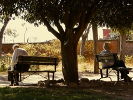Eye For Film >> Movies >> The Last Station (2012) Film Review
The Last Station
Reviewed by: Andrew Robertson

The old man is not alone in the boat. He holds his microphone aloft, behind him only fog, around only the ripple of the water. The tape records, in a still, small, silence. The cassette deck goes on, the river goes on, the fog goes on. We will not.
The Last Station plays to an audience in a Chilean retirement home. The tape is played on it. Other tapes too, rain failling, the crash of waves, again, again, cycles of water. Again, again, the names of the dead.

I once asked my grandmother what she had been doing. "Waiting", she said.
Directors Catalina Vergara and Cristian Soto watch these grandmothers, grandfathers, waiting. Gathering leaves, sleeping in the television room, curating a spidery list of telephone numbers that no longer connect, waiting.
The Last Station broadcasts to its waiting audience. Children play on the other side of a fence. The telephone does not cooperate. Nobody visits. They wait.
Observed over a period of months, a tree is transplanted, pruned, leaves fall, are gathered, the residents wait. They are strangers to us. There are few identifiers. There are photographs, but no visitors. The hospital for surgery. The sea to record. The Last Station broadcasts to its waiting audience.
This is a film that is at times painfully beautiful, with some striking sequences that are painterly in their execution. A blind resident calling out as she walks down an empty corridor. Others simply breathing, others simply blinking. A net curtain flaps in the wind between camera and subject, until the folds align such that the face is obscured, as surely as the far bank, the shore, in the fog.
Other suggest a constructedness; in the garden a choir sings Swing Low, haltingly, as a snail climbs a tree. Documentary, perhaps, in the Herzog sense - these things happened in front of a camera. A sequence of praying feels intrusive, prying. That these moments happened eventually is another waiting - so too for the audience. The light that Soto and Vergara captures is at times haunting, a doorway unfilled, a window unseen, a lamp turned off, a mirror. While there is doubtless expressionistic value in the light, the elegaic pacing and slow unfolding come close to tedium. There is undoubtedly aesthetic value here, perhaps even in the creation of a sense of waiting in the audience, for a conclusion, for an end. It is a difficult path to tread, however, and relies on the expectation that something will happen, that there is a direction, a goal. This is one for the patient.
The Last Station starts as it means to go on, always slowly, sometimes keenly, genuinely intimately, but mostly anonymously. These are the unknown, and eventually, perhaps save for this film, they will be the forgotten. The DJ intones; "death is a constant companion". The old man is not alone in the boat.
Reviewed on: 19 Jun 2013















